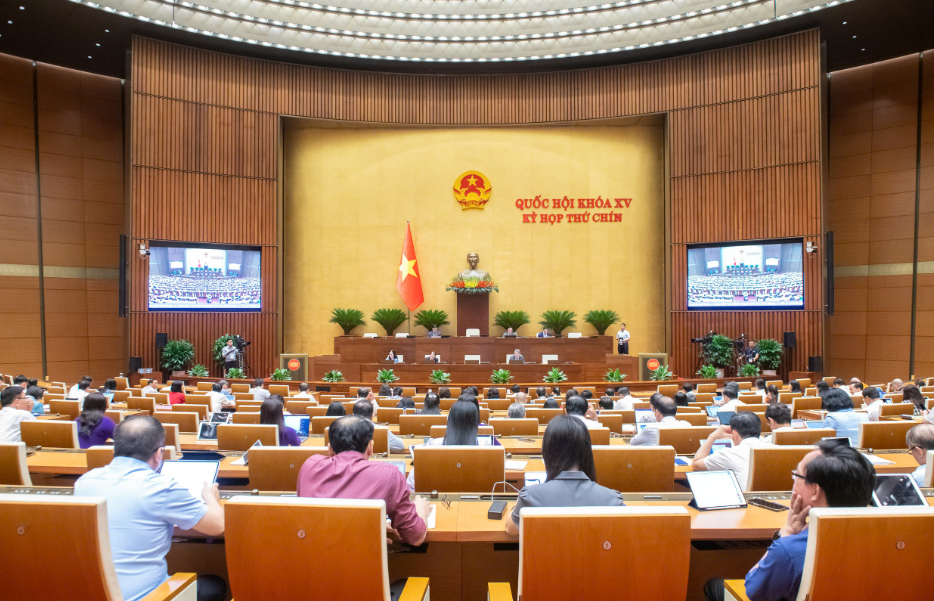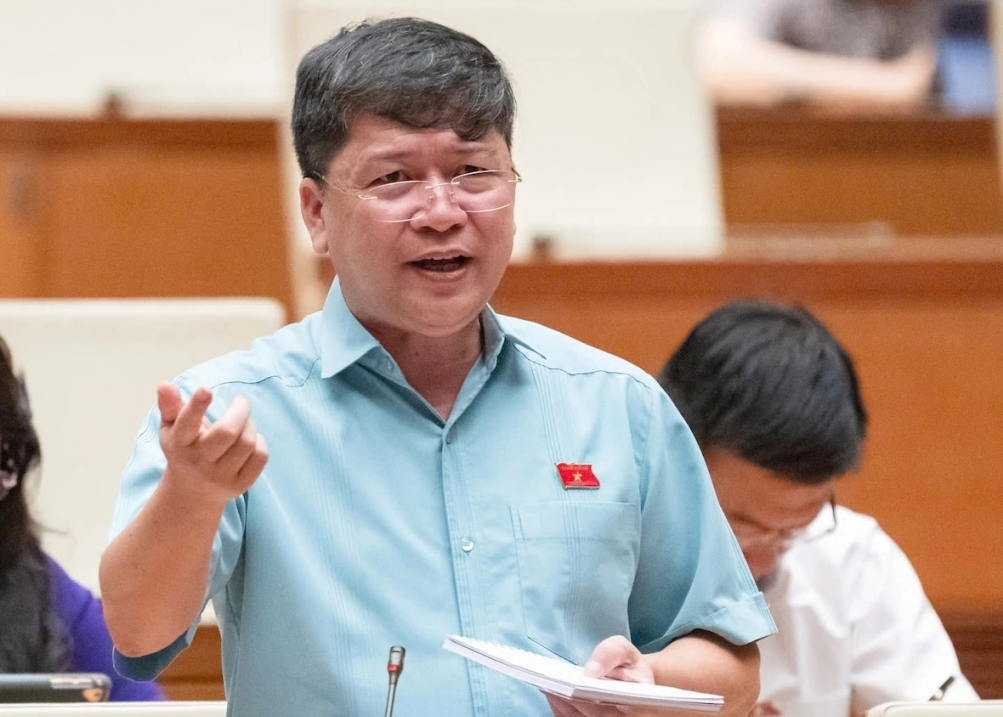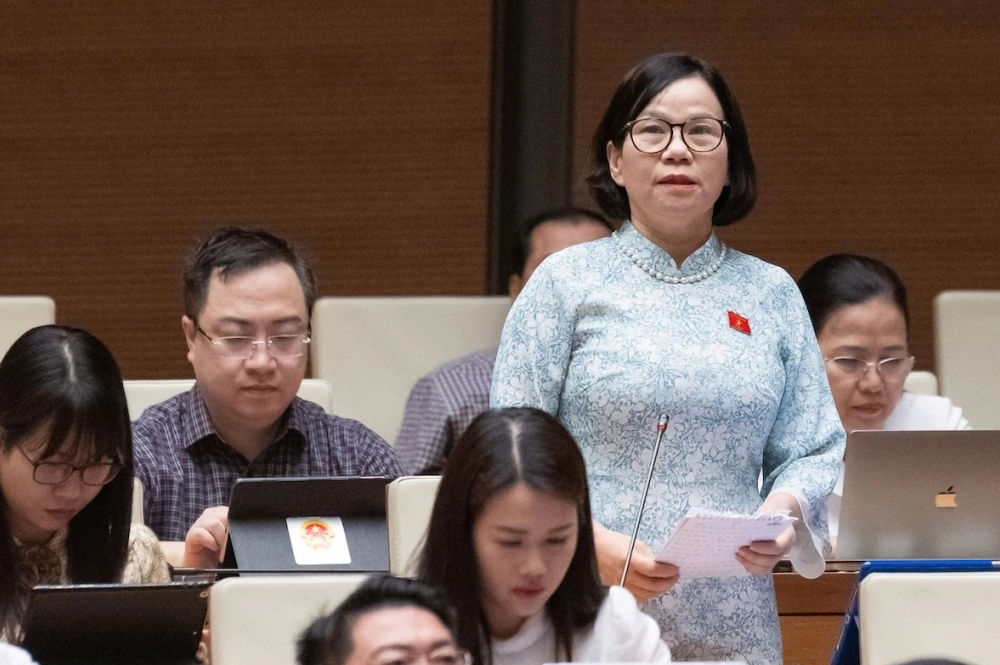Private sector needs breakthrough solutions to thrive
Stable policy implementation and supporting mechanisms are important for businesses to resolve commercial disputes and international integration.
THE HANOI TIMES — Support policies related to credit, land, and business premises in industrial zones and clusters are insufficient to effectively stimulate private enterprises, underscoring the necessity of more groundbreaking approaches.

The National Assembly in the plenary session. Photos: quochoi.vn
This view was expressed by Ta Van Ha, Vice Chairman of the Committee for Culture and Social Affairs, at a discussion session on May 16 on the National Assembly's draft resolution concerning special mechanisms to promote private sector development.
He added that private enterprises currently face many obstacles that must be overcome to facilitate growth.
According to him, Politburo Resolution 68 on private sector development is a breakthrough initiative that unlocks internal resources to drive national economic development in the new era. "I hope this resolution will be like a wind that lifts the kite of the private sector, allowing it to soar high," he said.
However, he expressed concern that the provisions in the draft resolution "are not strong enough." He noted that some of the content is already included in existing laws and resolutions. For example, the presumption of innocence is outlined in the Constitution. Therefore, it does not constitute a special mechanism for private businesses.
Nguyen Thi Thuy, Vice Chairwoman of the Committee on Legal and Judicial Affairs, agreed with Ha. "I propose removing the provision on the presumption of innocence in handling violations from the draft resolution because it is already stipulated in the Constitution and the Criminal Proceedings Code. Thus, it is not a unique or exceptional policy," Thuy stated.

Vice Chairman of the Committee for Culture and Social Affairs Ta Van Ha.
Similarly, the provision "not applying retroactive legal provisions that are unfavorable to businesses" is covered by the Criminal Code and the Law on Handling Administrative Violations. This principle applies not only to businesses, but also to organizations and individuals. Thuy requested that this content be removed from the draft resolution.
Regarding the provision stipulating that "asset sealing, confiscation, or freezing be proportionate to the estimated damages in a case," Thuy remarked that this issue is already addressed in the Criminal Code.
She suggested that the resolution allow companies to provide financial guarantees to unfreeze assets pending an investigation. This would allow owners to continue using these assets for productive and commercial purposes instead of allowing them to go to waste.
Currently, Vietnam has over 940,000 registered enterprises and more than five million household businesses. The private sector accounts for over 30% of total government revenue, 82% of employment, and approximately 50% of GDP.
Nguyen Thi Viet Nga, the deputy head of the Hai Duong Province National Assembly (NA) delegation, emphasized the need for more flexible mechanisms in the draft resolution. She suggested shifting from comprehensive inspections to follow-up inspections. However, Nga cautioned that relaxed policies have been exploited by certain individuals for opaque purposes. For example, they have used them to establish shell companies for issuing fake invoices, evading taxes, and laundering money. These actions have resulted in lost revenue and distorted the competitive environment.
"Authorities uncovered more than 600 shell companies that issued over 1 million fake invoices, totaling nearly VND64 trillion ($2.46 billion)," said Nga, who urged the adoption of robust, transparent post-inspection mechanisms to close the legal loopholes exploited by these fraudulent entities.

CEO of Nam Sung Vietnam Aluminum Co., Ltd Khuong Thi Mai.
Better law enforcement required
Ha, from the Committee for Culture and Social Affairs, also emphasized the importance of stable policy implementation, as well as supportive mechanisms for resolving commercial disputes and promoting international integration.
"Enterprises need policy stability. Many startups invest heavily upfront. However, when policies suddenly change, they are forced back to square one, which is extremely challenging,” he said.
Khuong Thi Mai, CEO of Nam Sung Vietnam Aluminum Co., Ltd., emphasized the importance of a National Assembly resolution that would lead to significant reforms in law enforcement, particularly in regard to administrative procedures related to investment, construction, land, and the environment. "We should not allow enterprises to spend more time waiting for investment approvals and administrative processing than it takes to build the project itself," said Mai.
She called for the elimination of unnecessary business conditions, such as investment procedures, approvals, certificates, and overlapping or inappropriate regulations that hinder the development of the private sector. She proposed reducing administrative processing time, compliance costs, and business conditions by at least 30%, with further cuts in subsequent years.
"Investors are currently operating on a project-by-project basis and are bound by the approved investment policy, which includes the project's scale, timeline, and implementation period. When they change their business strategy or production plan, they must seek approval again, which wastes time and adds unnecessary steps,” Mai added.
Regarding these lawmakers' concerns, Finance Minister Nguyen Van Thang stated that the provisions and policies in the draft resolution aim to formalize the content of Politburo Resolution 68.
As for inspections, bankruptcies, and handling law violations, Minister Thang said the draft only includes high-level principles to ensure consistency with the direction of Resolution 68. Specifically, the approach to inspections and examinations will shift from comprehensive inspections to follow-up inspections, without compromising the role of regulators or disrupting business operations. Authorities will still have the right to conduct ad hoc inspections in cases where there are signs of violations.
"We will incorporate feedback and finalize the draft resolution to ensure its practicality, feasibility, and consistency with existing regulations," Thang pledged.
The National Assembly is scheduled to vote on this draft resolution in the morning on May 17.












